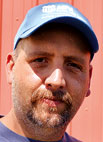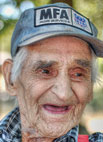
Bonnie and Van Vanderpool are two individuals from divergent backgrounds – hers as a lifelong resident of the Ozarks and the Dallas County farm where she still lives and his as a happy transplant from Chicago – have come together to establish their own micro-dairy farm, with sons, Trenton, age 12, and Will, age 5, in a unique and greatly self-sufficient lifestyle.
“Both sides of my family are actually from Crane, Mo.,” Van explained the meandering path that led him through many M’s as he put it, “musician, machinist, and now married milker.
Bonnie and I met in 2002 and became friends and a couple of years later, we got married.”
“I told him, my roots are here and that doesn’t change,” Bonnie, a former EMT, added, referring to the fact that the 11 acres where they now live is part of the original 139 acres her family has farmed for generations. Their boys are the seventh generation to live on that same land.
“We are tied here,” Van continued. “The bank told us we could live here as long as we keep making the payments.”
“We have approximately 30 goats, primarily La Mancha dairy goats but also some Alpines and Toggenburgs and of course, crosses. We also have a Jersey and a Holstein cow, a Holstein bull, and an 18-year-old Dexter cow. We raise our own veggies and chickens, too,” Bonnie continued. “I’ve got six 30 foot rows of green beans in right now that I sure hope make before the first frost.
“I started with goats as a freshman in high school. I had six does and a buck as an FFA project and the next thing I knew I had 50 head. My parents didn’t want anything to do with them so they were all mine. I sold milk then, too. After getting married, divorced, and going to work full time, I eventually sold off most of the herd, but when Trenton was about 5, he got interested in raising goats.”
Van grinned. “We do our own butchering, the occasional goat and chickens, but mainly beef and pork. With the goats, we have the goat’s milk and make our own cheese, yogurt, sour cream and soap which we also sell. She does lots of canning and freezing, too.”
Bonnie continued. “We ended up trading goats for a dairy cow with a friend near Humansville, Mo., to have the cow’s milk as a milk replacer for the baby goats and now we also use it for making butter since goats’ milk doesn’t work as well for that. We also make cream cheese, yogurt, sour cream and cottage cheese from cow’s milk.”
“Not much dairy farming and goat raising going on in the streets of Chicago,” Van admitted, “so I’ve learned a lot over recent years.” Still, Bonnie is the first to point out that he helps with the daily milking chores, as their cows are milked by hand and the goats are done by machine.
Five-year-old Will, their family vegetable lover, has grown up on goats’ milk and like his mother and brother, learned to milk goats as a very young child. Recently, he came home from school and announced that he drank a carton of milk at school. When his dad asked him about it, the boy sighed and shrugged. “That box milk just doesn’t have much flavor.”
Bonnie laughed and pointed out more basics to raising dairy goats. “Parasites are, of course, the biggest struggle with goats. With cows, you just have to make sure they have water and hay and you’re done. Like everyone in the Ozarks this year, we’re already feeding hay we would usually use for this winter so that’s a potential problem. With this kind of an operation, you have to make a real commitment. Every 12 hours, you’ve got to milk and it is best if you are here most of the time in between,” she added with a broad smile that said she didn’t mind that part either. “They are livestock but for us, they are also pets. Each one has a name and a different personality. Each one gets daily attention and affection.”
In December, their goats will start to ‘freshen,’ and the Vanderpools hope to have a new little herd of baby goats in time for Christmas. “We have 10 does that should all deliver within 48 hours of each other in January,” Bonnie concluded, “which means I’ll live in the barn as 10 to 40 babies are delivered. In the past, we’ve had singles, twins, triplets and quads. One set of quads that was fathered by a buck of ours made the front page of the local paper.”
Van, the native of Chicago, just shook his head with an amused grin. “News in the Ozarks.”







